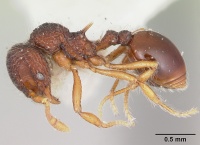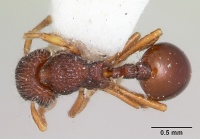Lachnomyrmex lattkei
| Lachnomyrmex lattkei | |
|---|---|

| |
| Scientific classification | |
| Kingdom: | Animalia |
| Phylum: | Arthropoda |
| Class: | Insecta |
| Order: | Hymenoptera |
| Family: | Formicidae |
| Subfamily: | Myrmicinae |
| Tribe: | Attini |
| Genus: | Lachnomyrmex |
| Species: | L. lattkei |
| Binomial name | |
| Lachnomyrmex lattkei Feitosa & Brandão, 2008 | |
Lachnomyrmex lattkei is one of the two species in the genus known only from the holotype. The specimen was collected in a leaf litter sample submitted to the Berlese funnel from an 1180m elevation forest in northern Venezuela.
Identification
Feitosa and Brandão (2008) - Body covered by fine, relatively sparse, and partially regular rugulation; promesonotum elevated well above propodeum level, in profile; metanotal groove impressed; propodeal spines straight and thin; teeth of propodeal lobes well developed; surface of first gastral tergite entirely devoid of long hairs. This species can hardly be confounded with any other in the genus given the body sculpturation pattern and the combination of elevated promesonotum, and the absence of long hairs on the dorsal surface of first gastral tergite.
Keys including this Species
Distribution
Distribution based on Regional Taxon Lists
Neotropical Region: Venezuela (type locality).
Distribution based on AntMaps
Distribution based on AntWeb specimens
Check data from AntWeb
Countries Occupied
| Number of countries occupied by this species based on AntWiki Regional Taxon Lists. In general, fewer countries occupied indicates a narrower range, while more countries indicates a more widespread species. |

|
Estimated Abundance
| Relative abundance based on number of AntMaps records per species (this species within the purple bar). Fewer records (to the left) indicates a less abundant/encountered species while more records (to the right) indicates more abundant/encountered species. |

|
Biology
|
Castes
Known only from the worker caste.
Nomenclature
The following information is derived from Barry Bolton's Online Catalogue of the Ants of the World.
- lattkei. Lachnomyrmex lattkei Feitosa & Brandão, 2008: 21, figs. 7, 18 (w.) VENEZUELA.
Unless otherwise noted the text for the remainder of this section is reported from the publication that includes the original description.
Description
Worker
Holotype HL 0.76; HW 0.72; ML 0.25; SL 0.49; EL 0.16; WL 0.85; PSL 0.21; PL 0.220.39; PPL 0.17; GL 0.99; TL 3.40; CI 96; SI 67; OI 22.
Color dark ferruginous, with appendages lighter. Head and mesosoma finely covered by vermiculate and predominantly longitudinal rugae, transverse on anterior portion of pronotum, grading to longitudinal on rest of promesonotum; mesopleura and lateral surfaces of propodeum sparsely covered by irregular rugae; mandibles with few and short longitudinal striae restricted to basal portion; petiole and postpetiole irregularly rugose. Abundant pilosity on head, dorsum of promesonotum and waist; dorsum of petiolar node and postpetiole each with more than 10 long hairs; first tergite of gaster entirely devoid of long flexuous hairs.
Head longer than broad, with vertexal margin gently convex; frontal lobes subquadrate; eyes with about seven facets at greatest diameter. Promesonotum considerably convex in profile, well above propodeum level; metanotal groove relatively broad and deeply impressed; propodeal spines straight and thin; teeth of propodeal lobes well developed, swollen basally, and with little less than the half-length of propodeal spines. Petiolar node only weakly elevated and rounded dorsally, in lateral view; dorsum of postpetiole slightly convex and without a well definite anteroventral projection.
Type Material
Holotype worker. VENEZUELA: Falcón: Petit, cia. La Maletta, Haitoncito, 3.vii.1982, J. Lattke col., no. 275, specimen code CASENT0173879 [MIZA].
Etymology
Species named after its collector, the prominent myrmecologist Dr. John E. Lattke, curator of the MIZA ant collection.
References
- Feitosa, R.M. & Brandão, C.R.F. 2008. A taxonomic revision of the Neotropical myrmicine ant genus Lachnomyrmex Wheeler (Hymenoptera: Formicidae). Zootaxa 1890, 1-49.

